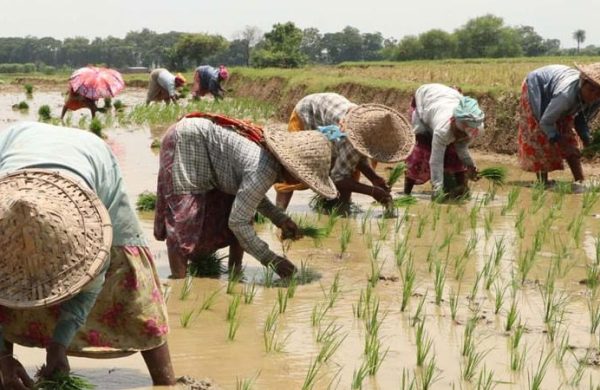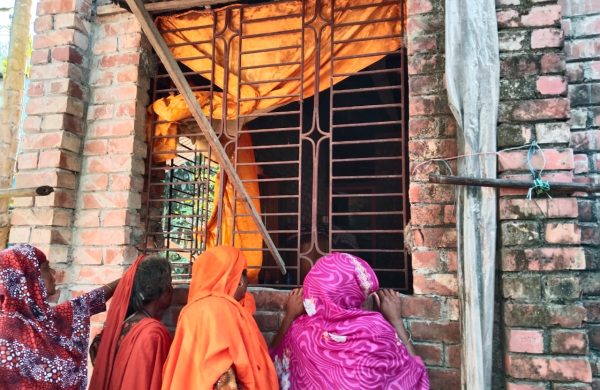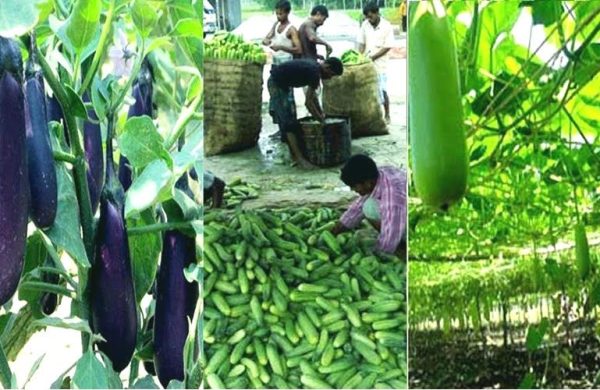Aman paddy transplantation underway amid frequent rainfall in Rajshahi
- Update Time : Thursday, July 17, 2025

Rajshahi Correspondent:
Aman paddy transplantation is currently underway as farmers are actively transplanting seedlings in the Rajshahi division, including the Barind tract with the goal of achieving a good harvest.
This process involves not only transplantation but also the crucial tasks of nurturing and caring for the seedbeds.
According to the sources concerned, the transplantation process is underway, indicating a widespread and active effort by farmers across the region.
Suitable climate conditions, including frequent rainfall, are contributing to the successful transplantation and overall farming activities.
Continuous rainfall since the end of summer has brought relief to farmers in Rajshahi, especially in the Barind region, allowing them to prepare seedbeds for transplanted Aman paddy cultivation.
Department of Agricultural Extension (DAE) Officials said Aman farming in the Barind tract is entirely rain-dependent.
In contrast to the last three years, when rainfall was inadequate during seedbed preparation, this year’s consistent rainfall has encouraged farmers to begin early preparations.
The transplantation process is creating job opportunities for many, including unemployed individuals, highlighting the economic impact of this agricultural practice.
The farmers are passing their time with seedling transplantation with nursing and caring for the seedbeds and the activities have created job opportunities for many unemployed people.
They are transplanting various high-yielding varieties, as well as some local and conventional ones, showcasing a diverse approach to paddy cultivation.
The farmers are engaged in this process with the hope of getting a good yield, indicating their optimism and dedication to the cultivation.
Seedbeds are being carefully nurtured and cared for, which is essential for the healthy growth of the seedlings before transplantation.
The Barind tract, known for its drought-prone nature, is also actively participating in Aman paddy cultivation, demonstrating the adaptability of farming practices in the region.
DAE officials said a target has been set to bring 84,255 hectares of land under Aman paddy cultivation in the district this season.
Deputy Director Umme Salma said the farmers are very interested in cultivating transplanted Aman paddy as they had a good yield and market price for both Aman and Boro paddy last season.
She said the seedbeds were prepared using rainwater and transplantation began.
Already, transplantation on 20 percent of the lands was completed and it will continue until August 20.
The local meteorological office recorded 568 millimeters of rainfall during the first 15 days of July.
Sazzad Hossain, a farmer of Damkura village under Paba Upazila, has started transplantation and will cultivate Aman paddy on 18 bigha of land. Earlier, he had prepared seedbeds successfully.
“While the rainfall has been a blessing, excessive rain could become a problem,” he added.
Zamir Uddin, another farmer of Palpur village under Godagari Upazila, had a good yield and market price of Aman paddy in the last season, inspiring him to cultivate the paddy on more land this year.
“I have planned to grow Aman paddy on all my lands this time and have prepared seedbeds,” said Zamir.
Mohammod Hossain, Chief Scientific Officer of the Bangladesh Rice Research Institute (BRRI), said they have released seven modern varieties of Aman paddy-Brridhan 51, 56, 66, 71, 75, 80, 87, and 90-for the Barind region.
Terming these varieties as high-yielding, drought-tolerant, disease-resistant, and maturing faster than older varieties like Swarna, he said farmers are being encouraged to adopt these varieties through block demonstrations, promotional plots, and free seed distribution.
He emphasized the need for collaborative efforts from scientists, researchers, and extension workers to increase Aman production and ensure national food security.
“As rice is the country’s staple, enhancing its production by overcoming disease and climate challenges is essential,” Dr Hossain added.
He said the appropriate timeframe for the paddy seedlings transplantation is up to August 20, while only the late varieties could be transplanted by the end of next month.
“Timely transplantation of Aman paddy seedlings is very important for healthy growth leading to optimum yield in the area,” he said.
He said some of the farmers are expecting the transplantation of seedlings after harvesting of Aush paddy. “We have some late varieties for them,” Dr Hossain added.















